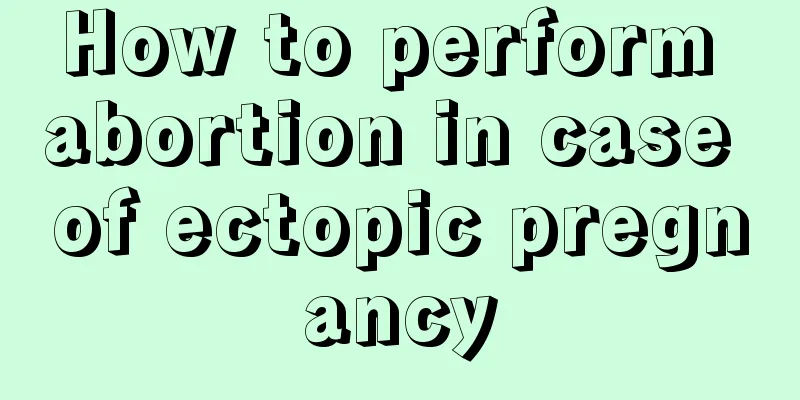Severe cases can be fatal! Do you really understand the dangers of postpartum depression?

|
It is normal for women to have mood swings after childbirth, but if they keep feeling low, hopeless, uneasy and helpless, it is likely a precursor to depression. If these emotions occur after childbirth, you need to pay attention to adjusting your mood in time to avoid postpartum depression. What are the symptoms of postpartum depression? Mild postpartum depression is manifested as fatigue, anxiety, insomnia, and poor memory. 40% to 80% of people will feel depressed 2 to 3 days after giving birth, but this depression is often transient and disappears automatically after two weeks. If the above symptoms do not disappear after two weeks, but become more and more severe, or even cause guilt, you must be highly vigilant because postpartum depression may have occurred. Why does postpartum depression occur? The causes of postpartum depression are relatively complex and are generally believed to be caused by multiple factors, among which postpartum neuroendocrine changes and social and psychological factors have a greater impact. The relationship between postpartum depression and postpartum depression is still unclear. People with postpartum depression do not necessarily develop postpartum depression, but those with postpartum depression are more likely to develop postpartum depression. It is also possible that some postpartum depression is a more severe type of postpartum depression, or is the result of the development of postpartum depression. What are the dangers of postpartum depression? Postpartum depression can cause the decline of the mother's nervous system function, affect the endocrine system, lead to physical fatigue, and make the mother easily depressed and irritable, thus forming a vicious cycle. At the same time, it leads to poor milk secretion in the mother, which in turn affects the normal nutritional intake of infants and young children. In severe cases, there may be suicidal thoughts and self-harm behaviors. In addition, due to the change of psychological emotions, postpartum depression patients will be affected in the role transition, parenting emotions, mother-child communication and other processes, causing varying degrees of harm to the intellectual development, emotional thinking and behavioral development of infants and young children, and even affecting family harmony. For example, postpartum depression can lead to poor concentration and decision-making, which will have adverse effects on children; excessive anxiety can lead to excessive care for children, inadvertently causing harm to children; attaching great importance to children and having serious cognitive problems can lead to dangerous conditions such as delusions of guilt, persecution, and auditory hallucinations, and even lead to suicide or dangerous behavior towards children. Foreign scholars have shown that children of mothers with postpartum depression have lower abilities than normal children. From the above, we can see that postpartum depression not only harms the physical and mental health of the mother herself, but also has adverse effects on the baby's emotional, intellectual and behavioral development. What are the measures for postpartum depression? Postpartum depression should be detected in time and treated correctly. If the mother is found to have abnormal behaviors or emotions such as sadness, crying, anxiety, etc., targeted treatment measures should be taken in time to avoid postpartum depression. Once postpartum depression occurs, especially for patients with severe depression, psychological treatment or drug treatment should be carried out in time. Currently, there are many intervention methods for postpartum depression, mainly psychological intervention. With the in-depth understanding of the mechanism of postpartum depression, more effective prevention and treatment of postpartum depression in women will be achieved in the future. This article was scientifically reviewed by Liu Guoyan, chief physician of gynecological oncology at Xinxiang Central Hospital in Henan Province. Produced by: Popular Science China Central Kitchen Producer: People's Daily Online Enjoy Health |
<<: Is depression just "sentimentality"? In fact, we are not far from it
>>: What is the difference between Wogan and Maogugan? Which one is more delicious?
Recommend
You're throwing away the most nutritious part of the celery!
Celery is a vegetable that everyone buys at home....
My baby is five months old and has little milk. What should I do?
After a newborn is born, drinking breast milk can...
Can I eat cold food one month after miscarriage?
The importance of a woman's physical recovery...
What happened to those people who didn’t sleep at night and didn’t get up in the morning?
Follow "Body Code Decoding Bureau" (pub...
B ultrasound normal with brown discharge
During the prenatal checkup, if the B-ultrasound ...
What happens if the abortion is not done cleanly?
Generally speaking, modern women who go to the ho...
What to do if you have forehead folliculitis
I have always had bangs because my classmates sai...
Why do I have chest pain before my period?
As a woman, there are a few days of discomfort ev...
Frequently asked questions and answers about HPV vaccination, please bookmark and forward!
According to statistics from the World Health Org...
Can moles also turn into cancer? Young people with moles should be careful, as these 3 places are the most dangerous
"The mole on your palm, I always remember wh...
What should I do if I get vaginal candidiasis during pregnancy?
Some women have abnormal problems in their bodies...
Is there anyone who is pregnant and still menstruating?
In everyone's cognition, it is believed that ...
Turning off the lights and browsing the phone is an invisible driver of glaucoma
■ Correspondent Yang Pu, our reporter Yang Yu Acc...
Causes of postpartum lochia
Many female friends who have just given birth hav...
Why does the cactus have black spots? The cactus has flower buds for more than two months but has not bloomed. Why?
Cactus is a drought-resistant plant. Many people ...









